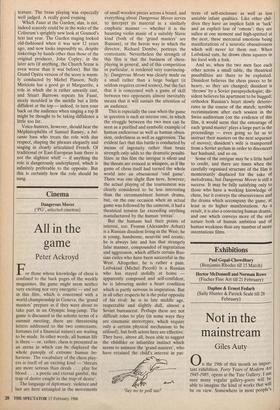Cinema
Dangerous Moves (PG', selected cinemas)
All in the game
Peter Ackroyd
For those whose knowledge of chess is confined to the back pages of the weekly magazines, the game might seem neither very exciting nor very energetic — and yet in this film, which is concerned with a world championship in Geneva, the 'grand masters' prepare as if they were about to take part in an Olympic long-jump. The game is discussed in the solemn terms of a summit meeting; there are threatening letters addressed to the two contestants; fortunes (of a financial nature) are waiting to be made. In other words, all human life is there — or, rather, chess is presented as an arena in which can be displayed the whole panoply of extreme human be- haviour. The vocabulary of the chess play- ers is itself of an exciting kind — 'threats are more serious than deeds . . . play for blood . . . a poetic and eternal gambit, the trap of desire caught in the trap of desire'.
The language of diplomacy, violence and lust are here entangled in the movements
of small wooden pieces across a board, and everything about Dangerous Moves serves to interpret its material in a similarly emphatic manner — whether it is the haunting violin music of a suitably Slavic kind (both of the 'grand masters' are Russian), or the heroic way in which the director, Richard Dembo, portrays the contestants. Nevertheless the strength of this film is that the business of chess- playing in general, and of this competition in particular, is rendered very convincing- ly: Dangerous Moves was clearly made on a small rather than a large budget (it seldom requires crowd scenes), but the fact that it is concerned with a game of skill between two opponents almost inevitably means that it will sustain the attention of an audience.
This is especially the case when the game in question is such an intense one, in which the struggle between the two men can be seen as a purified and symbolic example of human endeavour as well as human obses- sion, orderliness as well as aggression. The evident fact that this battle is conducted by means of ingenuity rather than brute strength only adds to the dramatic possibi- lities: in this film the intrigue is silent and the threats are evinced in whispers, as if the game of chess itself had turned the whole world into an obsessional 'end game'. There was one slight flaw here, however; the actual playing of the tournament was clearly considered to be less interesting than the circumambient human drama, but, on the one occasion when an actual game was followed by the cameras, it had a theatrical tension far exceeding anything manufactured by the human 'extras'.
But the humans had their points of interest, too. Fromm (Alexandre Arbatt) is a Russian dissident living in the West; he is young, handsome, neurotic and erratic; he is always late and has that strangely false manner, compounded of ingratiation and aggression, which afflicts certain Rus- sian exiles who have been successful in the West. Altogether, he is rather a pain. Leibskind (Michel Piccoli) is a Russian who has stayed stolidly at home — apparently composed and self-confident, he is labouring under a heart condition which is partly nervous in inspiration. But in all other respects he is the polar opposite of his rival: he is in late middle age, respectable and slightly dull, almost a Soviet bureaucrat. Perhaps these are not difficult roles to play (in some ways they are cinematic stereotypes, which require only a certain physical mechanism to be utilised), but both actors here are effective. They have, above all, been able to suggest the childlike or infantilist instinct which seems to animate the 'grand masters', who have retained the child's interest in pat- 'Say no to poll tax!' terns of self-enclosure as well as less amiable infant qualities. Like other chil- dren they have an implicit faith in 'luck' and an explicit fear of 'omens'; they are sullen at one moment and high-spirited at the next, these mercurial emotions being manifestations of a neurotic obsessiveness which will never let them rest. When Leibskind eats, he draws chess squares in his food with a fork.
And so, when the two men face each other across a small table, the theatrical possibilities are there to be exploited. Dissident believes the chess pieces to be heavy, so they are changed; dissident is 'thrown' by a Soviet parapsychologist; dis- sident believes his apartment to be bugged; orthodox Russian's heart slowly deterio- rates in the course of the match; terrible recriminations after each session in the Swiss auditorium (on the evidence of this film, it would seem that the entourage of each 'grand master' plays a large part in the proceedings — even going so far as to instruct their masters on the next sequence of moves); dissident's wife is transported from a Soviet asylum in order to disconcert her husband, and so on.
Some of the intrigue may be a little hard to credit, and there are times when the carefully organised structure of the film is momentarily displaced for the sake of melodrama, but Dangerous Moves is still a success. It may be fully satisfying only to those who have a working knowledge of chess, but it conveys the obsessiveness and the drama which accompany the game, at least in its higher manifestations. As a result, it is also a convincing human drama, and one which conveys more of the real nature both of human ambition and of human weakness than any number of more ostentatious films.





































 Previous page
Previous page